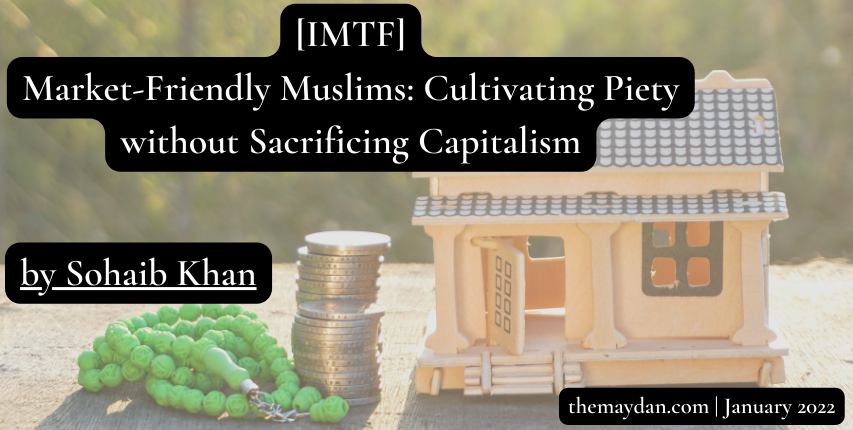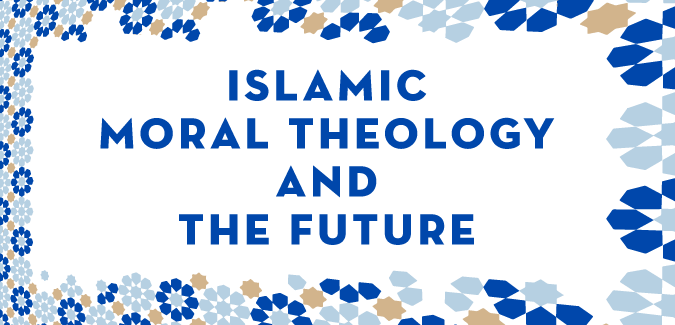
This essay is part of the Islamic Moral Theology and the Future (IMTF) Project, co-led by Maria Dakake and Martin Nguyen. It is specifically part of the roundtable discussion that is responding to Nguyen's opening essay “here.” See Dakake's opening essay “here” for a parallel line of inquiry.
It is one thing to expound the conceptual anatomy of virtue ethics as articulated in Islamic traditions of moral philosophy, mysticism, jurisprudence, etc.; it is another to examine how such articulations are extended and enacted by Muslims seeking to live by their faith in a world dominated by capitalism. In making this distinction, I am not trying to separate an “ideal” Islamic doctrine—inscribed in authoritative texts—from “actual” Muslim practices played out in history and culture. Instead, I wish to work towards a better understanding of Muslim virtue ethics by bringing these two levels of analysis into dialog with each other. I hope to sustain such a dialog between the Islamic textual tradition and its practices in my contributions to this forum.
Martin Nguyen’s inaugural post asks us to consider how Islamic virtues of voluntary poverty (faqr) and renunciation (zuhd) “relate and respond to” what may summarily be called the neoliberal condition inhabited by a vast majority of today’s Muslims. This invitation demands an inquiry that cannot proceed by taking the Islamic virtues in question as historical constants. Since faqr (voluntary poverty) and zuhd (renunciation) are virtues authorized within a discursive tradition, the meanings and devotional practices attached to these virtues are always subject to historical inflection and contestation. To complicate matters further, the market-oriented organization of individual and collective life that I have designated with the catch-all phrase “neoliberal” authorizes its own economy of virtues and ethics of subject-formation.[1] The analytical task that confronts us, therefore, is not one of determining whether poverty and asceticism can survive as Islamic virtues in a purportedly amoral and value-free world of capitalism. Instead, I read Nguyen’s provocation as compelling us to think about the particular forms these virtues may acquire once they migrate from traditional domains of piety to new moral economies of capitalism.
“Since faqr (voluntary poverty) and zuhd (renunciation) are virtues authorized within a discursive tradition, the meanings and devotional practices attached to these virtues are always subject to historical inflection and contestation.”
I want to pursue this line of thought by taking as my case study an ethical crisis that has enveloped an orthodox Muslim community, the Deobandīs, as they try to embrace capitalism in conformity with Islamic law. The Deobandīs are a traditionalist scholarly community who adhere to the Ḥanafī school of Sunnī jurisprudence. Bearing their name from the monumental Islamic seminary founded in late colonial India, the Deobandīs have evolved into the most influential Indo-Muslim denomination of contemporary Sunnī Islam. Over the past four decades, prominent Deobandī scholars, most notably Mufti Taqi Usmani, have been at the forefront in sanctioning what is today a $3 trillion global Islamic banking and finance industry. Islamic banking offers Muslims religiously permissible alternatives to interest-based finance that are functionally similar to conventional credit operations but avoid partaking in interest, which is strictly forbidden in the Qur’an. Deobandīs at large, however, remain sharply divided over the feasibility of making consumer finance and capitalism conform to the dictates of Islamic law. In the Islamic banking industry, this state of legal harmonization between the laws of scripture and the market is called “Sharī‘a Compliance.”
“Deobandīs at large, however, remain sharply divided over the feasibility of making consumer finance and capitalism conform to the dictates of Islamic law.”
Deobandī critics of Islamic banking denounce it as a travesty of Islamic commercial law, a form of financial gimmickry that serves the goals of capitalism under an Islamic garb. Islam and capitalism, they argue, are ethically incompatible, and no amount of legal maneuvering can align them. In contrast, Deobandī proponents of Islamic banking remain optimistic about tweaking the legal architecture of conventional finance just enough to make it “Sharī‘a Compliant.” Capitalism, according to them, is hegemonic and inescapable, leaving Muslims with no choice but to tweak a system that conscripts their faith and livelihood. If Muslims are to survive, let alone flourish, in capitalist economies operating on the principle of interest-based debt, they must devise practical alternatives from within that system rather than fantasize about post-capitalist utopias.
“While much of the disagreement on Islamic banking’s religious authenticity centers on legal debates over the technical soundness of Sharī‘a Compliant financial instruments, I want to focus on the ethical dimensions of complying with God’s law in the market.”
While much of the disagreement on Islamic banking’s religious authenticity centers on legal debates over the technical soundness of Sharī‘a Compliant financial instruments, I want to focus on the ethical dimensions of complying with God’s law in the market. What I alluded to above as the ethical crisis in the Deobandī community emerges from the transference of Islamic virtues to new sites of discipline and subject-formation modeled on the market.[2] Moral concepts are indeed integral to any tradition of virtue ethics, but the cultivation of virtue primarily depends on the correct performance of a practice. One’s ability to articulate the moral justification of a particular virtue, therefore, is not central to embodying that virtue in practice.[3] Theological traditions like Islam presuppose a teleological scheme of ethics in which the self can be trained into a virtuous subject through appropriate discipline and practice.[4] The virtues of voluntary poverty (faqr) and renunciation (zuhd), for instance, are associated with a set of prescribed rituals that function as “technologies of the self.”[5] If a Muslim wishes to acquire the virtue of zuhd, they must follow a disciplinary regimen of spiritual and bodily exercises, such as remembrance (dhikr) and fasting (ṣawm), until that virtue becomes sedimented into their disposition. Virtue ethics is, therefore, a matter of constituting one’s subjectivity through the development of individual skills and capacities. Just as these subjectivities can be fashioned through pedagogies of the self, they can also be instilled through disciplinary mechanisms of the state and the market. Since institutions of capitalist modernity work far more effectively than traditional religion to socially engineer our preferences, habits, and patterns of consumption, they are also central to our formation as ethical subjects.
“For the Deobandīs, the ethical crisis generated by the turn to Islamic banking may be distilled into the following question: can a Muslim sustain Islamic virtues while also adopting a lifestyle enmeshed in capitalist consumption?”
For the Deobandīs, the ethical crisis generated by the turn to Islamic banking may be distilled into the following question: can a Muslim sustain Islamic virtues while also adopting a lifestyle enmeshed in capitalist consumption? Sharī‘a Compliance seems to suggest that Muslims can both have their virtue ethics and embrace consumer capitalism. Thanks to the proliferation of Sharī‘a Compliance in global markets, Muslims can now enjoy religiously permissible varieties of mortgages, credit cards, foods, clothing and fashion, and even COVID vaccines. Sharī‘a Compliance has effectively authorized a culture of consumption by opening new markets to previously untapped Muslim consumers. But lest this development begins to sound like a capitalist conspiracy geared towards secularizing pious Muslims, we must return to the question of the transferability of religious virtues. The justificatory literature on Islamic banking encourages Muslims to use their wealth as a means of seeking the pleasure of God. It sanctions the acquisition and expenditure of one’s wealth in a religiously permissible, i.e., Sharī‘a Compliant, manner as an act of worship. As Muhammed Gamal Abdelnour elaborated in his illuminating contribution to this forum, medieval Muslim theologians did not categorically dismiss the pursuit of wealth as impious. Instead, they conditioned the spiritual vice or merit of wealth on its consequence for the believer. Whereas wealth that nurtured material greed and heedlessness from God was condemned, wealth spent in charity and other praiseworthy causes strengthened one’s faith.
Similarly, Deobandī proponents of Islamic banking remind Muslims that ownership of wealth is a trust from God that bestows certain duties and responsibilities. Taqi Usmani, the most authoritative living Muslim jurist on Islamic banking, differentiates the concept of private property in capitalism from its authorization in Islam.[6] According to Usmani, a Muslim cannot own capital with the absolute freedom to expend it however they wish. Complete sovereignty over one’s wealth is a capitalist delusion that turns wealth into a symbol of immortality.[7] Usmani cites the example of Qārūn, a wealthy figure from the time of Prophet Moses who was condemned in the Qur’an for his ostentation and false sense of pride. When Qārūn is reminded by the pious to reciprocate God’s gift of wealth by spending it to secure his salvation in the hereafter, he retorts: “This wealth was given to me on account of the knowledge I possess” (28:78). In contrast to Qārūn’s assertion of absolute discretion over his wealth, Usmani reminds Muslims that their wealth can only be spent on lawful (ḥalāl) expenditures. If a Muslim pays the obligatory alms tax (zakāt), avoids spending money on illicit (ḥarām) indulgences, and prioritizes eternal salvation (ākhira) over the transient materiality of this world, the accumulation of wealth shall not impede such a Muslim’s pious formation.

The growth of Islamic banking and Sharī‘a Compliant businesses in Pakistan has triggered a spate of Islamic writings catered to the pious Muslim businessman. The leading contributor to this new trend in Islamic literature is the weekly “Shariah and Business” magazine published under the auspices of the “Jamia tur Rasheed” seminary in Karachi. A selection of articles recently compiled in book form offers motivational advice and practical wisdom on “soft skills,” “personality development,” “time management,” and “business psychology” to guarantee material and spiritual success for the Muslim businessman. Titled Business Ethics, the volume prescribes recitational techniques of remembrance (dhikr), moderation in forms of dressing and adornment, and an ethic of spending (infāq) towards charitable causes.[8] Business Ethics portrays the pious Muslim businessman as disciplined, frugal, and unadorned but always able to make a profit. This symbolic austerity is reflected in Sharī‘a Compliant marketing campaigns that observe strict Islamic dress codes and rules of gender segregation. A focus on lawful spending legitimates the desire for commodities, and gratitude in the face of divine providence displaces the usual seductive aesthetics of consumption. Even if Islamic banking does not exclusively promote the kind of voluntary poverty (faqr) and asceticism (zuhd) that was the hallmark of Sufi Muslim sages, it offers a compromise between these virtues and an ascetical variety of capitalism.
“While there is merit to studies that call attention to the marketization of religion, they tend to overestimate the power of capitalism to subsume religious disciplines and underestimate crucial differences between religious traditions.”
The conjunction of riches, simplicity, and mindfulness is not unique to the disciplinary program of Sharī‘a Compliance—modern exemplars of such virtues of ascetical capitalism could range from Steve Jobs to Hindu “business gurus.”[9] Some commentators have drawn on Islamic banking to theorize a new “spiritual economy” that mobilizes religious virtue ethics in service of market-oriented objectives.[10] While there is merit to studies that call attention to the marketization of religion, they tend to overestimate the power of capitalism to subsume religious disciplines and underestimate crucial differences between religious traditions. Islamic banking and Sharī‘a Compliant consumption have undoubtedly created room for religious virtues to thrive within capitalism. However, the virtues in question must undergo reconfiguration to survive this migration to the capitalist marketplace, whether by necessity or design. Is it possible that the disciplinary mechanisms of capitalism could subvert these virtues altogether, thus dislocating them from what Sami al-Daghistani has called the “moral cosmology” of Islamic economic practices? In my next essay in this roundtable, I will bring some ethnographic specificity to this seemingly abstract question by conversing with Deobandī proponents and critics of Islamic banking.
Sohaib Khan is a scholar of comparative Islamic studies who studies connections between religion, law, and economic life in the Islamic Middle East and South Asia. Trained as an interdisciplinary historian and ethnographer, Sohaib received his Ph.D. (2020) from Columbia University’s Department of Middle Eastern, South Asian, and African Studies. He is currently a Visiting Assistant Professor in Islam at Pomona College and a Faculty Fellow at the Warren Center for American History at Harvard University. Sohaib is currently working on his first book, Translating Capitalism: How Muslim Jurists and Bankers Invented Sharī’a Compliance. Illuminating a world of expertise in which religion, law, and finance are deeply entangled, Translating Capitalism shows how South Asian Muslim jurists are reconfiguring finance from the margins of global capitalism.
[1] For an illuminating study on the moral discourses and practices that provide sustenance to neoliberal doctrine and policy, see Andrea Muehlebach, The Moral Neoliberal: Welfare and Citizenship in Italy (Chicago: The University of Chicago Press, 2012).
[2] For a sustained argument on the need to study the marketplace as a site for new religious formations, see Kathryn Lofton, Consuming Religion (Chicago: The University of Chicago Press, 2017).
[3] Talal Asad describes this contrast between understanding and practicing a virtue perhaps a bit too sharply: “Discourse involved in practice is not the same as that involved in speaking about practice. It is a modern idea that a practitioner cannot know how to live religiously without being able to articulate that knowledge.” Talal Asad, Genealogies of Religion: Discipline and Reasons of Power in Christianity and Islam (Baltimore: The Johns Hopkins University Press, 1993), 36.
[4] Alasdair MacIntyre, After Virtue: A Study in Moral Theory (Notre Dame: The University of Notre Dame Press, 2007), 53.
[5] For a detailed discussion of this concept, see Michel Foucault, “Technologies of the Self” in Ethics: Subjectivity and Truth: Vol. 1 of Essential Works of Foucault, 1954-1984, ed. Paul Rabinow, trans. R. Hurley et al. (New York: New Press, 1997), 223-254.
[6] Taqi Usmani, Ghayr Sūdī Baynkārī: Muta‘alliqah Fiqhī Masā’il kī Taḥqīq aur Ishkālāt kā Jā’izah (Karachi: Maktabah-i Ma‘ārif al-Qur’ān, 2009).
[7] See Colin Turner, “Wealth as an Immortality Symbol in the Qur’an: A Reconsideration of the māl/amwāl” Journal of Qur’anic Studies 8, no. 2 (2006): 58-83.
[8] ‘Umar-Fārūq Rāshid, Tijāratī Akhlāqiyāt (Business Ethics) (Karachi: Al-Hijaz, 2017).
[9] Deonnie Moodie, “Corporate Hinduism: An Argument for Attention to Sites of Authority in a Nascent Field of Research,” Religion Compass 15, no. 2 (2021): 1-9.
[10] Daromir Rudnyckyj, Spiritual Economies: Islam, Globalization, and the Afterlife of Development (Ithaca: Cornell University Press, 2010).


